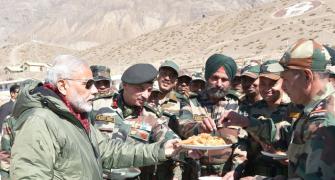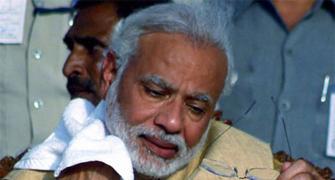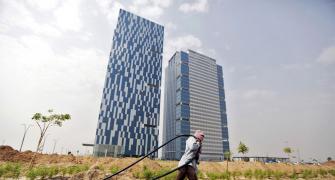Diplomats agree that amid stormy relations with China and Pakistan, Modi has posted impressive foreign policy successes, notes Aditi Phadnis.
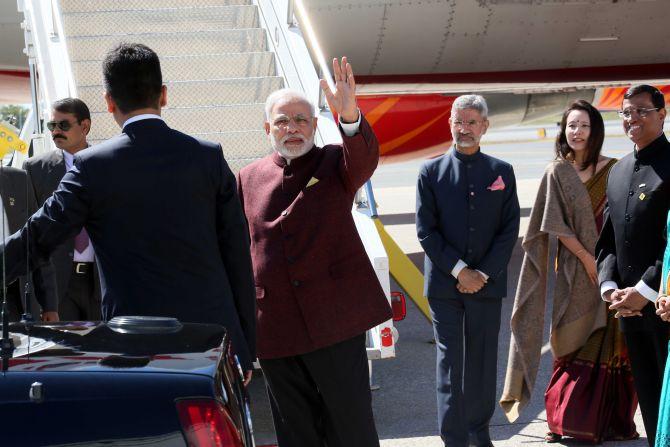
When veteran diplomat Hardeep Puri retired from the Indian Foreign Service as India’s Permanent Representative at the United Nations, he confessed candidly that domestic politics had come in the way of India claiming its place in the world.
“In New York, there were moments when I wished we had a stronger government in New Delhi. One of my regrets has been that we worked so hard and after 17 years we got into the Security Council (as a non-permanent member), but the government in New Delhi was completely preoccupied with domestic issues,” he said in an interview to Business Standard then.
“To push issues like the expansion of the Security Council or India's permanent membership in the Security Council, it would have been nice if we had had a stronger government in Delhi. But at the time, all that the government was preoccupied with was the 2G spectrum scam and how to manage alliance partners,” he said.
That changed in 2014, when Narendra Modi came to power. In a conversation with reporters months after he was appointed as the PM, Modi readily agreed that with a single-party majority, it was much easier to function internationally -- India was taken more seriously.
Three years later, this is the theme that has recurred, with diplomats citing instances of the ways Modi’s strength at home has made India more effective in putting its point across, whether in relation to Bangladesh (a country with which India’s relations have seen a 360-degree improvement, especially vis-à-vis India’s North-East); or the United States (providing unambiguous comfort on liability in the civil nuclear liability law by leveraging the National Democratic Alliance majority in the Lok Sabha to amend the law).
According to Harsh V Pant, distinguished fellow and head of the Observer Research Foundation’s Strategic Studies programme: “Three factors appear to have had a significant influence (on Indo-US relations under Modi as PM). A conviction that India’s developmental priorities cannot be met without substantive cooperation with the US; the strong political authority Modi enjoys within his own party and in the Indian Parliament; and the structural changes in India’s security environment brought about by an aggressive China and its growing strategic convergence with Pakistan”.
In this context, many found Modi’s initial wooing of the Indian diaspora puzzling. Why the diaspora, when with a parliamentary majority, Modi could effect domestic reform that would have the world look at India with envy?
One of the men who led the outreach, Vijay Chauthaiwale, who heads Overseas Friends of BJP, explained: “They (the Indian diaspora) can tell them (investors) about the good changes taking place in India and remove the image of India as an inefficient place to visit and invest in,” he told the Washington Post.
Sreeram Chaulia, professor and dean at the Jindal School of International Affairs, O P Jindal Global University, who has written a book on Modi’s foreign policy, says, “The diaspora diplomacy of the Modi doctrine has added to India’s international influence. It is a force multiplier that makes India’s presence in far-flung parts of the world more coherent, organised and visible at the grassroots level. The benefits of people-to-people and public relations with the Indian diaspora, which has been stirred into action by Modi, are central to the Indian prime minister’s larger strategic objective of turning India into a ‘leading power’ on the world stage.”
However, T P Sreenivasan, former IFS officer who has dealt with Indian communities in the US, Fiji, Kenya, and Europe, strikes a note of sober caution.
“The Indian diaspora is more prosperous than before and its involvement in India’s development is increasing. Indians overseas are conscious of their opportunities in India. At the same time, new fears about scaled-up return of Indians or their involvement in global terrorism are raising their heads. Firefighting is not enough. We should have a comprehensive plan involving both the Centre and states to invest remittances intelligently and to find alternative ways of livelihood for those who return.”
The global economic environment is echoing that concern. Remittances from workers abroad are falling alarmingly.
In 2015, according to the World Bank data, Indians working abroad sent home about $69 billion, down 1.5 per cent from $70 billion in the previous year. This is likely to come down further.
A 2016 World Bank report says: “This year the South Asia region would see a decline of 2.3 per cent in remittances to the region due mainly to the impact of declining oil prices and labor market nationalization policies on remittances from GCC countries.”
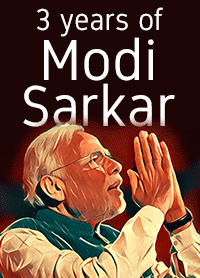 Little wonder then that at Bengaluru, which hosted the Pravasi Bharatiya Divas in January this year, Modi made a direct linkage between foreign policy and diaspora investment, telling NRIs real patriotism would be to send more and more money back home: “FDI has two definitions -- foreign direct investment and first develop India,” he said.
Little wonder then that at Bengaluru, which hosted the Pravasi Bharatiya Divas in January this year, Modi made a direct linkage between foreign policy and diaspora investment, telling NRIs real patriotism would be to send more and more money back home: “FDI has two definitions -- foreign direct investment and first develop India,” he said.
But a domestic political majority-driven foreign policy has had its downside.
For countries which have investible sovereign wealth funds, India is a promising investment destination. But concerns have surfaced, which cannot be wished away.
An Indian investment advisor attached to a prominent UAE-based sovereign fund told Business Standard that controversies like lynching because of mere suspicion of storing beef and rhetoric that seems to have Islamophobia at its heart, make it harder to persuade these countries to commit funds to India.
“For the ruling families in the Gulf, it is confusing. ‘Till yesterday, India and Indians were our friends -- have things really changed so much?’ they ask us,” he said. “We try and explain. It is not always easy.”
Despite these problems, diplomats agree that Modi has posted impressive foreign policy successes.
In the neighbourhood, despite initial missteps, relations with Nepal have reached an equilibrium under Pushpa Kamal Dahal’s prime ministership, senior diplomats say. When K P Oli was prime minister, the damage was so much that during President Pranab Mukherjee’s recent visit, #PranabDaSaySorry was trending on social media, notes former ambassador to Nepal Rakesh Sood.
However, creative interventions by the Modi administration have managed to turn the situation around. The same applies to relations with Sri Lanka, which seemed to be in a deep strategic embrace with China in the not so distant past.
Geethanjali Natraj, professor at the Indian Institute of Public Administration, points out in a commentary that talk of upgrading the India-Sri Lanka free trade agreement to include a new trade pact called the Economic and Technological Cooperation Agreement, which is expected to be signed by the end of 2017, will enhance trade in services, investments, and technology cooperation with India’s five fastest-growing southern states -- Karnataka, Tamil Nadu, Kerala, Andhra Pradesh, and Telangana.
“Given these states’ proximity to Sri Lanka, the ETCA would leverage Sri Lanka’s unique geo-strategic location, which is at the crossroads of major shipping routes. The ETCA would also increase regional integration and could make Sri Lanka the geo-economic centre of South Asia.”
With Pakistan, Modi’s gamble is yet to show results -- and the disturbance in Kashmir is not making his task of managing relations with that country any easier. However, the most dramatic change has come about in relations with Bangladesh.
“India and Bangladesh are on a path of cooperation that will be hard to reverse,” says Veena Sikri, former Indian ambassador to Dhaka, referring to recent agreements to cooperate in developing energy, sharing river waters, and building a railway line.
In dealings with the US, the PM has shrugged off the past palaver over the “denial of the visa” and has used a term that defines new relations between the two countries.
He has tossed away the hesitations of history. Stronger US ties are among Modi’s top achievements since taking office, says Lalit Mansingh, former Indian ambassador to the US.
However, with internal political volatility of a kind not seen before in the US, the jury is still out on how Modi will handle the US for the remainder of his tenure.
Diplomats are divided on India’s relations with China during the three years of Modi. While protagonists of the motherhood and apple pie approach suggest stirring up sleeping dogs is not a good idea, those who are more radical feel it is India’s time and China should know this.
“A peaceful, democratic and stable China is in the interest of India and the two countries should nurture their peace process as incidents like the land encroachments along the Line of Control disturb the friendly atmosphere in the region,” says former Indian ambassador to Beijing, Ashok Kantha.
But journalist Prem Shankar Jha disagrees. “For three years, Prime Minister Narendra Modi has been indulging in acts of bravado in foreign policy that he believes, or wants the people of India to believe, are acts of bravery. The most recent is his boycott of the One Belt One Road forum meeting in Beijing,” Jha writes (New Delhi’s official reason for not attending is that the China-Pakistan Economic Corridor passes through Gilgit, which has been illegally occupied by Pakistan since 1947, and attending the meeting would have risked conceding sovereignty). “This is poppycock,” says Jha.
He adds that the boycott is tantamount to India cutting off its nose to spite its face.
Modi clearly does not agree.


